Archive for June, 2011
100 years since the birth of Milosz.
30 Jun 2011June 30th, 2011 marks the 100th anniversary of the birth of Nobel Prize winning poet Czeslaw Milosz. Polish President Bronislaw Komorowski has inaugurated an International Centre of Dialogue in an estate in Krasnogruda, close to the Lithuanian border. The ceremony was attended by the poet’s son, Anthony Milosz, and by representatives of Polish and Lithuanian governments. The house belonged to the family of the poet’s mother.
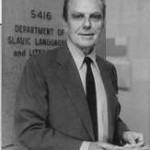
University of California
Czeslaw Milosz was born in present-day Lithuania, to partly Polish, partly Lithuanian parents, and was brought up in the multinational milieu of Vilnius. He graduated from the University of Vilnius with a degree in law. In 1951, Milosz appealed for political asylum in Paris, then in 1960, he moved from France to the United States. He taught for many years at the University of California, Berkeley. After the fall of communism, the poet returned to Poland and spent the last years of his life in Krakow, where he died in 2004, at the age of 93.
His best known work was The Captive Mind, which looked at the treatment of intellectuals under communist rule. His poetry was widely acclaimed internationally, but it was not until 1973 that his work was translated into English, allowing it to be appreciated by a wider audience.
For Lithuanian President Dalia Grybauskaite laying a memorial plaque at Vilnius University the poet’s work is a testament to Polish-Lithuanian solidarity. The most important event of the Milosz Year was the Literary Festival, which took place in Krakow from May 9th to May 15th .
Milosz’s Year – Site.
Our Polish EU Presidency.
30 Jun 2011
Logo
Polish Prime Minister Donald Tusk presented information in Parliament concerning the priorities of the Polish Presidency, which will commence on 1 July this year. The Prime Minister emphasised that during the Presidency the government wants not just to maintain but to increase Poland’s status as a responsible and highly valued state.
“It is expected that the Presidency will allow us to jointly create political leadership which does not consist of taking routine decisions but which may help the EU as a whole,” he said. “It is of paramount importance that during the Presidency we can maintain and increase Poland’s status as a country which is highly valued in internal EU debates and which demonstrates a high level of responsibility with regard to the EU’s foreign relations,” he underlined, adding that Poland will also want to maintain and increase its status as a responsible country in dealing with economic and financial issues.
The Prime Minister stressed that Poland has developed its image as a state which is capable of being a new driving force in the European Union. “Today Poland is treated as one of the leaders – of which unfortunately there are few in the EU – which strive to force through issues of EU-wide significance,” stated the Prime Minister. In his view, from the beginning of the economic crisis Poland constantly came out against the revival of state control and nationalism which was visible in the actions and statements of some politicians and EU Member States.
Mr Tusk drew attention to the fact that it is important for good political initiatives to emerge during the Polish Presidency. “We have a significant interest in Poland’s Presidency being remembered by Europeans through issues including the finalising of long-term processes,” he said. “It is possible that during the Polish Presidency we will see the completion of negotiations with Croatia, which would mean that the accession treaty will be signed during the Presidency,” stated the Prime Minister. He added that completion of negotiations with Ukraine on an association agreement and agreement on free trade is also realistic. “This would be the first successful step in the process of bringing Ukraine closer to Europe,” the Prime Minister stated.
Full article – Polish Presidency of the EU.
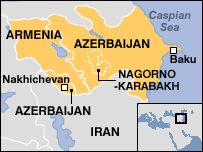 La diplomazia del Cremlino registra un passo a vuoto. Nell’arco di una settimana è saltata la sua mediazione sia per il Nagorno-Karabakh che per la Transnistria. Da dopo il conflitto con la Georgia per l’Ossezia meridionale nel 2008 Mosca cerca di risolvere i problemi degli “Stati non riconosciuti” con lo scopo di evitare guai peggiori in futuro ed infiltrazioni esterne nello spazio ex sovietico.
La diplomazia del Cremlino registra un passo a vuoto. Nell’arco di una settimana è saltata la sua mediazione sia per il Nagorno-Karabakh che per la Transnistria. Da dopo il conflitto con la Georgia per l’Ossezia meridionale nel 2008 Mosca cerca di risolvere i problemi degli “Stati non riconosciuti” con lo scopo di evitare guai peggiori in futuro ed infiltrazioni esterne nello spazio ex sovietico.
Soltanto progressi, ma non accordi. Così si può definire l’esito del tanto atteso summit a tre russo-armeno-azero per l’annosa questione del Nagorno-Karabakh. A Kazan i presidenti Medvedev, Sarghsjan ed Aliev hanno raggiunto una reciproca comprensione dei problemi da risolvere, si legge nel documento finale. Il punto di partenza del negoziato sono i cosiddetti “principi di Madrid”, definiti nel 2007.
Ma per decidere la loro attuazione – quindi la firma di una “road map” – ci vorrà ancora tempo. Mosca e la comunità internazionale fanno pressioni invano sia su Erevan che su Bakù per trovare una soluzione duratura. Il rischio di una nuova guerra è alto, affermano gli specialisti.
Scoppiata nel febbraio ‘88 la questione del Nagorno-Karabakh, enclave armeno in territorio azero, fu il primo segnale del risveglio delle nazionalità in Urss. Dopo una sanguinosa guerra negli anni Novanta la provincia ha dichiarato la sua indipendenza da Bakù.
Discorso simile anche per la Transnistria-Dniestr. Dopo 5 anni di interruzione Mosca ha tentato, senza risultato, di scongelare il negoziato nel quadro del 5+2, ossia Russia, Ucraina, OSCE, Unione europea, Usa più Moldavia e Transnistria.
Le parti, tuttavia, hanno immediatamente affermato di non voler ricominciare a trattare e che le loro posizioni rimangono immutate. La Moldavia punta ad essere uno Stato unitario e rifiuta di creare un sistema federale con la provincia separatista. La Romania, assai influente a Chisinau, mira a riunire una delle sue regioni storiche. La Russia propone a sua volta il mantenimento dell’integrità territoriale moldava e la concessione di uno statuto speciale per il Dniestr. Tiraspol prosegue nella sua linea indipendentista. 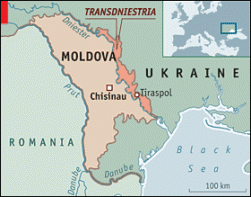
La Transnistria, popolata in prevalenza da popolazioni slave, si è liberata dal controllo di Chisinau nel 1992 dopo un breve conflitto armato. Oggi è utilizzata come una specie di off-shore da compagnie russe ed ucraine.
NB.
I cosiddetti “principi di Madrid” sono stati aggiornati l’anno scorso dai mediatori internazionali. Essi prevedono in particolare la riconsegna all’Azerbaigian dei territori intorno al Nagorno-Karabakh; il mantenimento di uno status temporaneo che garantisca all’enclave sicurezza ed autonomia; un corridoio che l’unisca all’Armenia; la definizione di un suo futuro status giuridico attraverso una dichiarazione della sua popolazione; il diritto di tutti i profughi a tornare alle proprie case; garanzie di sicurezza internazionale con la presenza di una forza di pace.
Цивилизация в туалетах.
26 Jun 2011 «Современные итальянцы унаследовали особое внимание к водопроводно-канализационной тематике…Как тут не вспомнить мое первое пребывание в Москве в 1988 году….самое шокирующее зрелище открылось мне в туалетах у трех вокзалов, где посетители были вынуждены сидеть прямо на унитазе, прикрываясь газетами — двери в “кабинках” с полуметровыми стеночками отсутствовали. Именно тогда я осознал уровень неуважения советского государства к своим гражданам…
«Современные итальянцы унаследовали особое внимание к водопроводно-канализационной тематике…Как тут не вспомнить мое первое пребывание в Москве в 1988 году….самое шокирующее зрелище открылось мне в туалетах у трех вокзалов, где посетители были вынуждены сидеть прямо на унитазе, прикрываясь газетами — двери в “кабинках” с полуметровыми стеночками отсутствовали. Именно тогда я осознал уровень неуважения советского государства к своим гражданам…
Интересно было наблюдать, как менялись нравы в “туалетном” вопросе в постсоветской России. Как известно, Муссолини научил итальянцев не плевать на дорогу. А благодаря распространению туалетных кабин в Москве дворы и подъезды стали почище. И это было заметное иностранцу достижение первого десятилетия ельцинского демократического правления.
Но на пути к развитой “туалетной” демократии россиянам преждевременно радоваться: большой труд еще впереди. Я путешествовал по США, Канаде, Австралии — странам огромным, как и Россия, — нигде не видел, чтобы люди, остановив машину на шоссе, бегали по кустам, а то и справляли нужду прямо на обочине, на глазах у других автомобилистов! Там, как и в Европе, через каждые несколько километров трассы есть специальные комплексы, состоящие из мотеля, кафе и, конечно же, туалетов.
В московских кафе-ресторанах справить нужду запросто могут и не пустить. Морально устаревшие “синие кабинки” на улицах часто очень грязны, но во многих местах и их не хватает. Вот самые острые “туалетные” проблемы вашей страны.
Но в эпоху “модернизации” технологии все-таки помогают. Прочитал в российской прессе о том, что столичное ЖКХ скоро расставит по столице принципиально новые туалетные кабины, которые будут все делать автоматически, включая спуск воды и продувку воздухом. И даже смогут выдержать взрыв внутри! Что ж, с нетерпением жду появления в Москве этого шедевра XXI века».
Статья Джузеппе Д’Амато Московский Комсомолец № 25676 от 25 июня 2011 г. Giuseppe D’Amato Moskovskij Komsomolets.
It will not be easy for Kiev’s Court to determine whether Ms. Yulia Tymoshenko is victim of a plot or she is really guilty. The former heroine of the pro-European Orange Revolution in November 2004 is accused of “abuse of power.” In 2009 she signed directly with her Russian colleague Mr. Vladimir Putin contracts for the supply of gas, causing around 130 million euros in damages to the national Treasury, say the investigators. The hot climate, not only for the temperature, will not help the judges. 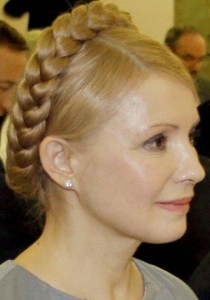
If convicted the former Ukrainian “Joan of Arc” could face up to 10 years in prison. The European Union and the United States have sent their observers. There are already numerous dossiers on members of the former government and former Interior Minister Yuri Lutsenko was arrested for “embezzlement”. Parties close to Ms. Tymoshenko accused the Russophone archenemy President Viktor Janukovich of wanting to turn himself into a dictator and former prime minister has asked the European Court of Human Rights to rule, since the charges were politically motivated. “This is just a farce,” she went down hard early in the process. This is a revenge of the “coward” Yanukovich against her.
The definition of the price of gas has always been problematic. There are many factors that contribute to shape it in a little transparency. Since the collapse of the USSR Ukrainians and Russians have been constantly on stormy relationship, going so far as to fight two “wars”. Pipelines were blocked twice in 2006 and in 2009 and Europe was left frozen in winter.
President Yanukovich assured Western capitals that justice and politics are well separated in his country. In an interview with a French newspaper the Ukrainian leader said that the price set in 2009 was “unfair.” Kiev accepted to pay $ 450 per thousand cubic meters, when at the free market it was 179. “Today – asserted Yanukovich – should be less than $ 200.”
Russi ed italiani a difesa del crocifisso.
22 Jun 2011 Cattolici ed ortodossi hanno in comune la difesa del crocifisso e la Russia si è unita all’Italia nel farlo. Come si ricorderà, in marzo, il Consiglio d’Europa ha dato ragione a Roma contro una precedenza sentenza in cui si vietava la presenza del simbolo cristiano nelle scuole della Penisola. 
All’ambasciata di Mosca è stata presentata l’edizione russa del libro di Carlo Cardia L’identità religiosa e culturale europea. La questione del crocefisso. “L’idea di far tradurre e pubblicare in russo il volume – racconta l’ambasciatore Antonio Zanardi Landi – mi è stata offerta in occasione del primo incontro con Sua Eminenza il Metropolita di Volokolamsk Hilarion” ed “è stata incoraggiata in seguito da Sua Santità il Patriarca Kirill in occasione della prima udienza che ha voluto concedermi dopo il mio arrivo”.
Nella prefazione in russo il metropolita Hilarion, ministro degli Esteri del Patriarcato di Mosca ha scritto che Kirill ha “giudicato l’operato della Corte un attentato alla comune identità cristiana dell’Europa e ha salutato favorevolmente la decisione delle Autorità italiane di adoperarsi per rimuovere tale affronto”. E poi “l’impegno congiunto degli Stati europei e dei leader religiosi il cui risultato è stato il ristabilimento della giustizia nel caso ‘Lautsi contro l’Italia’, ha dimostrato che i popoli europei sono disposti a difendere la propria identità cristiana”.
Stop allo Scudo anti-missilistico occidentale.
22 Jun 2011Un “no” deciso allo Scudo anti-missilistico occidentale. Dopo mesi di trattative dietro alle quinte russi e cinesi hanno espresso pubblicamente la loro contrarietà. Si teme una nuova prossima corsa agli armamenti in stile Guerra Fredda. 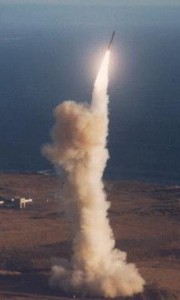
Come si ricorderà gli Stati Uniti di Obama hanno modificato il progetto originario di George Bush, abbassando il rischio esterno di lanci isolati di vettori da parte dei Paesi cosiddetti “canaglia”, Iran e Corea del Nord su tutti. Gli americani, in pratica, intendono creare non più difese globali, ma mettere in piedi dei sistemi regionali contro missili a corto e medio raggio. Mosca è stata invitata da Washington a partecipare al progetto europeo insieme alla Nato, ma qualcosa, evidentemente, non sta funzionando. Gli incontri tra specialisti militari non avrebbero dato finora esiti favorevoli.
Il problema, in realtà, pare più politico. In Russia si stanno avvicinando le elezioni generali. Si voterà a dicembre per le legislative e nel marzo 2012 per le presidenziali. Tradizionalmente i politici federali, troppo schiacciati su posizioni pro-occidentali, fanno fatica ad imporsi. Inoltre il nodo su chi tra Dmitrij Medvedev ed il premier Vladimir Putin si presenterà candidato non è ancora stato sciolto e la “telenovela” tra i due è destinata a durare a lungo.
Nei giorni scorsi la Repubblica ceca ha annunciato di rinunciare ad ospitare uno dei siti del mini-Scudo regionale. I repubblicani americani se la sono subito presa con il presidente Barack Obama, accusato di aver venduto gli alleati dell’Europa orientale ai russi, con la sua politica estera di eccessive aperture al Cremlino.
La scelta di Praga, al contrario, è stata salutata positivamente da Mosca, che teme che quelle difese anti-missilistiche nel Vecchio Continente servano non contro lanci di lontani nemici bensì per tentare di mettere sotto controllo il suo arsenale.
Nelle settimane in cui nessuno se le manda a dire è entrato in campo a sorpresa anche il segretario della Nato Anders Fogh Rasmussen, che ha definito come “soldi buttati via” il progetto russo per lo sviluppo di nuovi missili balistici intercontinentali. “Questo tipo di retorica – ha osservato il capo dell’Alleanza Atlantica – non è necessaria; questo tipo di mentalità è fuori dai tempi”. Pronta la replica del capo dello Stato maggiore federale Ivashov, che ha affermato come “I loro progetti non li ha capiti nessuno”. La crisi libica in pieno sviluppo e dalle molte incognite, la possibile discussione al Consiglio di Sicurezza dell’Onu per una risoluzione sulla Siria e l’avvicinarsi degli appuntamenti elettorali in Russia sono un cocktail poco digeribile. Il caldo dell’estate porta inatteso nervosismo.
ДАМ: «Я хотел бы, но…».
21 Jun 2011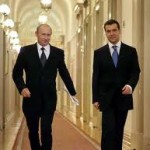 «В интервью британской газете “Файнэншл Таймс” Дмитрий Медведев подтвердил что он хотел бы еще раз стать президентом, но не уверен, что ему позволят это сделать…
«В интервью британской газете “Файнэншл Таймс” Дмитрий Медведев подтвердил что он хотел бы еще раз стать президентом, но не уверен, что ему позволят это сделать…
“Любой руководитель, который занимает такую позицию, как президент, – Дмитрий Анатольевич сказал – просто обязан хотеть баллотироваться. Другой вопрос, будет ли он для себя это решение принимать или нет, вот это решение несколько отстоит от его желания”… Почему для обнародования столь важной вести ДАМ выбрал именно иностранное, а не российское СМИ?… “Что касается второго срока – Медведев говорил -, то ответ на этот вопрос должны дать люди, потому что именно они определяют, хотят они видеть того или иного человека или не хотят. И я, как действующий политик, буду исходить из этого при принятии решения. Я полагаю, что ждать осталось совсем недолго. И я надеюсь, что это будет правильное решение для Российской Федерации и для меня лично”… Использование Медведевым слова “люди” — не более чем дань политической корректности… Почему ДАМ хочет от Путина полной ясности уже сейчас? Помнится, в 2007 году имя следующего президента было обнародовано лишь ближе к концу года. Мне кажется, что в этом как раз и заключается ключевой момент затеянной Медведевым политической игры… Премьер рассчитывает, что подконтрольный ему Народный фронт окажется по итогам декабрьских выборов в Думу политическим триумфатором. После этого лидеры “фронтовиков” выйдут и во всеуслышание провозгласят: Дмитрия Анатольевича мы, конечно, очень уважаем. Но в качестве следующего президента мы хотим видеть только нашего любимого Владимира Владимировича!… Сможет Путин сказать и нечто другое: сам я в президенты не пойду. Но всей душой поддерживаю кандидатуру мистера X. При таком раскладе Путин по-прежнему остается первым лицом российской политики. И мне почему-то кажется: этим “мистером X” не обязательно будет Медведев. ВВП не очень-то любит, когда члены его команды затевают собственные политические игры… Поэтому-то Дмитрий Анатольевич и пытается сейчас сыграть на опережение… Дмитрий Медведев перешел в политическое наступление. Но его атака на данный конкретный участок фронта вполне может захлебнуться. Очень возможно, что президенту придется вскоре пересмотреть свою тактику или смириться с поражением».
Статья Михаил Ростовский Московский Комсомолец 20 июня 2011 г. Mikhail Rostovsky Moskovskij Komsomolets
Baltic region. New challenges, old adversaries.
20 Jun 2011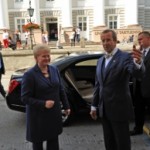 How to prevent future threats to the Baltic region was the main topic at the Estonian – Lithuanian summit, held in Tartu. The two states seek to become NATO’s energy and cyber security hubs not forgetting a recent period of tension with Russia.
How to prevent future threats to the Baltic region was the main topic at the Estonian – Lithuanian summit, held in Tartu. The two states seek to become NATO’s energy and cyber security hubs not forgetting a recent period of tension with Russia.
Estonian President Toomas Hendrik Ilves assured the support of his country in developing the energy security centre in Lithuania into a NATO Centre of Excellence, as the alliance’s cyber defence centre in Tallinn. His Lithuanian colleague Dalia Grybauskaite highlighted that both countries are united by the common goal of preventing the use of energy as a political tool. It is therefore necessary to speed up the integration of the Baltic States’ electricity market into the Nordic market (NordPool), to diversify energy supplies and to reduce dependence on a single supplier.
Mrs. Grybauskaite said that his country supported the construction of a LNG terminal in Estonia or in Latvia, but it had decided to build its own terminal in Klaipeda. She pointed out that several terminals operating in the Baltic countries would increase competition in the gas market, ensure lower consumer prices and strengthen the region’s energy independence.
“Estonia is still interested in participation in the Visaginas nuclear power station,” President Ilves assured, adding that Eesti Energia is currently considering the offers of two potential investors. “Let us hope that the negotiations for finding and involving a strategic investor will be successful and the new nuclear power station will be a project that will really enhance the energy security and independence of the region considerably.”
Speaking about cyber security, Mrs. Grybauskaite proposed to follow the recommendations of the former foreign minister of Norway, Jens Stoltenberg, and to form a Nordic-Baltic cyber defence force.
For a further European integration Mr. Ilves said that “When can we take a high-speed train from Estonia, through Latvia and Lithuania, to Berlin? When will we finally have a modern Via Baltica, which connects all of us and then runs further, to Poland? When will the Baltic states no longer be an energy isle, separated from the rest of Europe? The answers to these questions will also represent our evaluation of the health of our regional co-operation in the 21st century.”
Presidents Ilves and Grybauskaite discussed the neighbourhood policies of the European Union, with an emphasis on Ukraine, Georgia, Moldova and Belarus.
“The government in Minsk, which talks to its people in the language of batons and imprisonment, is not fit to be a part of today’s Europe. In this case, the European Union should use powerful words to provide balance, by uniting its voice with its mind; the pressure on the Belarusian regime needs to be powerful and efficient, with all sanctions very accurately aimed,” President Ilves added.
Travel to the Baltic Hansa, book by Giuseppe D’Amato.
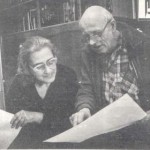 Elena Bonner era una donna dal coraggio incredibile e dai principi solidissimi. Tutta la sua vita è stata una lotta continua per affermare i valori in cui credeva. Figlia di un funzionario del Comitern e di un’attivista comunista ebrea Lusik Alikhanova (il suo nome alla nascita) vide i suoi genitori condannati dalle purghe staliniane. Il padre fu fucilato nel 1938, mentre la madre si beccò 8 anni di carcerazione nei gulag. Affidata a dei parenti a Leningrado Elena studiò letteratura, quindi lavorò come infermiera nell’Armata Rossa. Ferita durante un attacco aereo recuperò velocemente le forze per terminare la Seconda guerra mondiale in Austria.
Elena Bonner era una donna dal coraggio incredibile e dai principi solidissimi. Tutta la sua vita è stata una lotta continua per affermare i valori in cui credeva. Figlia di un funzionario del Comitern e di un’attivista comunista ebrea Lusik Alikhanova (il suo nome alla nascita) vide i suoi genitori condannati dalle purghe staliniane. Il padre fu fucilato nel 1938, mentre la madre si beccò 8 anni di carcerazione nei gulag. Affidata a dei parenti a Leningrado Elena studiò letteratura, quindi lavorò come infermiera nell’Armata Rossa. Ferita durante un attacco aereo recuperò velocemente le forze per terminare la Seconda guerra mondiale in Austria.
Dopo la conclusione delle ostilità si prese una laurea in Medicina. Quindi nel 1965 si iscrisse al Pcus, pentendosi dopo la Primavera di Praga e lasciando definitivamente il Partito nel 1972. In tutti gli anni Sessanta, durante il periodo chruscioviano, frequentò i processi contro i dissidenti. Continuò anche dopo la presa di potere di Breznev. Nel 1970 conobbe a Kaluga in un tribunale Andrej Sakharov, il padre pentito della bomba atomica sovietica all’idrogeno, ormai caduto in disgrazia per le sue posizioni politiche. I due si sposarono nel 1972.
Iniziò una vita durissima al margine della società sovietica. Fu Elena a ritirare il premio Nobel ad Oslo assegnato al marito nel 1975. L’anno successivo i due furono tra i fondatori del Gruppo moscovita di Helsinki per la difesa dei diritti umani. Nel 1980 il potere comunista passò alle maniere dure, trasferendo la coppia in modo coatto a Gorkij, l’attuale Nizhnyj Novgorod, città allora chiusa agli stranieri.
Tre volte il grande fisico fu costretto a degli scioperi della fame per far ascoltare le sue ragioni. Due di queste in difesa della moglie: contro un’azione giudiziaria e per farla operare al cuore all’estero. Solo nel 1986, dietro pressioni internazionali, Michail Gorbaciov liberò la coppia dall’esilio di Gorkij. Nel marzo 1989 Andrej Sakharov fu eletto deputato al Parlamento dell’Urss su candidatura dell’Accademia delle Scienze, ma nel dicembre dello stesso anno morì a Mosca per un infarto all’età di 69 anni.
Elena Bonner continuò da sola l’azione politica. Fu scelta dal presidente russo Boris Eltsin nella Commissione federale per la difesa dei diritti umani, da cui si dimise dopo l’inizio della guerra in Cecenia, definita come un “genocidio”. Quindi assunse posizioni d’opposizione contro le scelte di Vladimir Putin e chiese nell’agosto 2008, dopo la guerra con la Georgia, che la Russia venisse espulsa dal G8. Il 10 marzo 2010 Elena Bonner, ormai residente negli Stati Uniti, è stata la prima firmataria del manifesto di alcuni intellettuali “Putin deve andarsene”.
Nel 2009 il presidente Dmitrij Medvedev ha dichiarato che le idee di Andrej Sakharov sono ancora attuali. Gli rispose amaramente la Bonner che i principi affermati “pace, progresso e diritti dell’uomo” sono dimenticati in Russia, perché non inculcati e fatti crescere nella gente. Il mondo ormai appartiene ad un’altra generazione.
Giuseppe D’Amato
Welcome
We are a group of long experienced European journalists and intellectuals interested in international politics and culture. We would like to exchange our opinion on new Europe and Russia.
Categories
- Breaking News (11)
- CIS (129)
- Climate (2)
- Energy&Economy (115)
- EU Eastern Dimension (85)
- Euro 2012 – Sochi 2014 – World Cup 2018, Sport (43)
- Euro-Integration (135)
- History Culture (198)
- International Policy (261)
- Military (74)
- Interviews (18)
- Italy – Italia – Suisse (47)
- Odd Enough (10)
- Poland and Baltic States (126)
- Religion (31)
- Russia (421)
- Survey (4)
- Turning points (4)
- Ukraine (176)
- Российские страницы (113)
Archives
- November 2020
- October 2020
- September 2020
- August 2020
- July 2020
- May 2020
- April 2020
- March 2020
- January 2020
- December 2019
- November 2019
- October 2019
- September 2019
- August 2019
- July 2019
- June 2019
- May 2019
- April 2019
- March 2019
- February 2019
- December 2018
- November 2018
- October 2018
- September 2018
- August 2018
- July 2018
- June 2018
- May 2018
- April 2018
- March 2018
- February 2018
- January 2018
- December 2017
- November 2017
- October 2017
- September 2017
- August 2017
- July 2017
- May 2017
- March 2017
- January 2017
- December 2016
- November 2016
- October 2016
- September 2016
- July 2016
- June 2016
- May 2016
- April 2016
- February 2016
- January 2016
- November 2015
- October 2015
- September 2015
- June 2015
- April 2015
- March 2015
- February 2015
- January 2015
- December 2014
- November 2014
- October 2014
- September 2014
- August 2014
- July 2014
- June 2014
- May 2014
- April 2014
- March 2014
- February 2014
- January 2014
- December 2013
- November 2013
- October 2013
- September 2013
- August 2013
- July 2013
- June 2013
- May 2013
- April 2013
- March 2013
- February 2013
- January 2013
- December 2012
- November 2012
- October 2012
- September 2012
- August 2012
- July 2012
- June 2012
- May 2012
- April 2012
- March 2012
- February 2012
- January 2012
- December 2011
- November 2011
- October 2011
- September 2011
- August 2011
- July 2011
- June 2011
- May 2011
- April 2011
- March 2011
- February 2011
- January 2011
- December 2010
- November 2010
- October 2010
- September 2010
- August 2010
- July 2010
- June 2010
- May 2010
- April 2010
- March 2010
- February 2010
- January 2010
- December 2009
- November 2009
- October 2009
- September 2009
- August 2009
Our books




